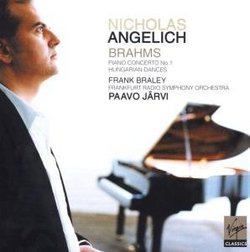| All Artists: Johannes Brahms, Paavo Järvi, Frankfurt Radio Symphony Orchestra, Frank Braley, Nicholas Angelich Title: Brahms: Piano Concerto No. 1; Hungarian Dances Members Wishing: 0 Total Copies: 0 Label: Virgin Classics Original Release Date: 1/1/2008 Re-Release Date: 4/1/2008 Album Type: Enhanced Genres: Dance & Electronic, Classical Styles: Forms & Genres, Concertos, Symphonies Number of Discs: 1 SwapaCD Credits: 1 UPCs: 400000006437, 5099951899820 |
Search - Johannes Brahms, Paavo Järvi, Frankfurt Radio Symphony Orchestra :: Brahms: Piano Concerto No. 1; Hungarian Dances
 | Johannes Brahms, Paavo Järvi, Frankfurt Radio Symphony Orchestra Brahms: Piano Concerto No. 1; Hungarian Dances Genres: Dance & Electronic, Classical
|
Larger Image |
CD Details |
CD ReviewsA soft, shapeless performance, but gorgeously recorded Santa Fe Listener | Santa Fe, NM USA | 04/02/2008 (2 out of 5 stars) "It's heartening to root for rising young pianists, and I expected a lot from 37-year-old Nicholas Angelich, who hangs around with Martha Argerich and records with others in her circle (such as the Capucon brothers, with whom Angelich made an admired set of Brahms piano trios). I was also surprised to find that despite his Paris-based career, Angelich is American. Since he has recorded four previous CDs of Brahms, my hopes were high for this Concerto #1. Paavo Jarvi gets off to a sluggish start, with mushy phrasing and no attempt to discipline Brahms's sprawling exposition. When Angelich enters, he falls into line, unfortunately, giving us lovely, mellow piano sounds (abetted by an outstanding recording) that don't bring the solo part into sharp focus. This is a heroic work, and we are supposed to sense the stuggle and conflict inherent in a stream of grand events. At least that's how every other pianist approaches the Brahms First, in my experience. Floating on a cloud isn't part of the program. Jarvi and Angelich clearly want the piece to make a new impression, one of unbroken lyrical flow, and they stay true to their conception through the limp Adagio and rhythmically lifeless finale. An already disjointed work comes apart at the seams, leaving this listener little room for enthusiasm. The CD is filled out with nine Hungarian Dances, played four-hand with Frank Braley. The absence of punch and vitality in these silky performances leads me to believe that Angelich sees Brahms very differently from the way I do -- smoother, carefully nuanced, and much less robust and energetic. There's room for that approach, just not on my record shelves." An excellent Brahms recording! Chicago Musician | Chicago, IL USA | 04/17/2008 (5 out of 5 stars) "This is an excellent new Brahms recording from Nicholas Angelich and Pavel Järvi. Angelich plays with great beauty and variety of tone and observes Brahms's dynamic markings meticulously. The soloist's first entry is truly played piano, as marked in the score, yet he has huge reserves of power when needed. He phrases beautifully, and only occasionally fails to convince with his rubato.The orchestral playing is excellent and the orchestral balance is exemplary. An excellent performance, which is far superior to recent recordings by Andsnes and Zimerman. The Hungarian dances are an inspired coupling. Angelich and Frank Braley relish this music and they play with great rythmic verve and kaleidascopic colors. Their ensemble is truly breathtaking!" Commanding and Enjoyable Brahms I. Martinez-Ybor | Miami, FL USA | 10/18/2008 (5 out of 5 stars) "Brahms First sounds like music that initially must be tamed before beauties are to be revealed. The very good news indeed is that Nicholas Angelich, as we had begun to suspect from earlier chamber recordings, is its total master, and indeed reveals all the beauties inherent in this great score. His interpretation, together with Jarvi, presents a great piece of music which incorporates an astoundingly difficult piano part here played with power, nuance, beauty of tone, sense of structure (no, Angelich does not fight the orchestra nor is he swamped by it), rather with clarity, insight and power, we have a collaboration that reveals the score in its majestic sweep. One has to go back to the Zimerman and Bernstein dvdBrahms: Piano Concertos 1-2for as satisfying a performance. The recorded sound is magnificent.
The selection of Hungarian Dances played by Angelich with Frank Braley in their original piano four-hands version are sheer delight, and an easy flowing complement to the final rondo movement of the concerto. The virtuosity, rhythmic freedom, the coloristic piano detail that these two wonderful pianists bring to their playing will bring delight to the many hearings this CD will elicit. Every note just seems to be right, with no more and no less the lightness of touch or heavy accent that is called for in the score, while always sounding honest and spontaneous, both pianists swinging side by side to the slancios in the music and the vibrant gypsy rhythms. One cannot help but feel that Angelich and Braley thoroughly enjoyed recording these pieces, and makes one wish to play with some imaginary friend sitting by one's side in front of the keyboard. Hearing this, one is reminded how much fun playing piano four-hands can truly be." |

 Track Listings (12) - Disc #1
Track Listings (12) - Disc #1